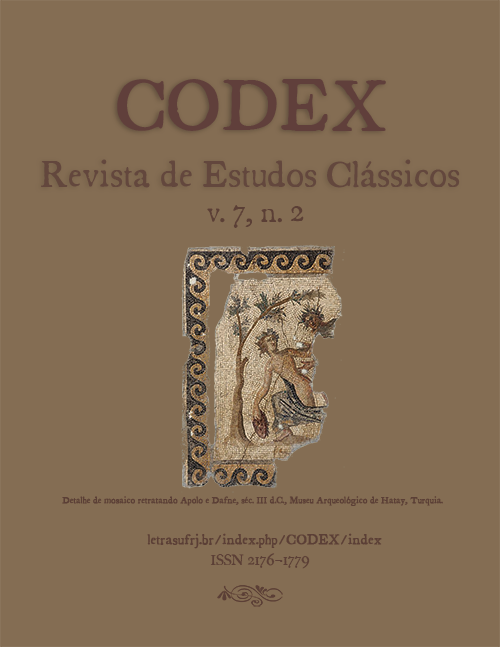Terence’s Adelphoe according to Seneca’s De Ira: a “tragicomedy” of anger?
DOI:
https://doi.org/10.25187/codex.v7i2.26538Keywords:
anger, Adelphoe, Seneca, TerenceAbstract
This article intends to point out convergent points between the philosophical thought about the passion of anger by Seneca in his treatise and the comic characterization of this vice in the Terence’s comedy Adelphoe. Reading the play following Seneca’s perspective, Demea, a typical pater iratus, is easily associated with the vice of anger, but the same philosophical work would allow us to understand Micio as someone involved by this pathos as well: after all, when secondary to other vices, says Seneca, anger can be momentarily hidden or can manifest in less strident ways. Understanding Micio as na angry and proud character elucidates the end of the play, when him, who has had a relatively positive attitude to raise his son, is abandoned by the boy at the end of the comedy. Finally, adopting the interpretatation that both the senes are trapped in anger, a feeling that brings nothing but destruction, we understand his creation of a lenient and arrogant persona to deal with his brother, which arouses the desire for revenge in him. Endowed with a punctual failure that makes him lose everything, Micio, in a way, resembles a tragic character appropriate to the tragedies of Seneca, in a smaller comic record.References
ARISTÓTELES. Poética. Tradução de Eudoro de Souza. 2ª edição. Edição Bilíngue. São Paulo: Ars Poetica, 1993.
BUSTOS, M. N. Los Hermanos de Terencio: un conflicto de caracteres. Circe No 13 / 2009 / ISSN 1514-3333 (impresa) / ISSN 1851-1724 (en línea), pp. 65-73.
CARDOSO, Z. A. A literatura latina. 3ª ed. rev. São Paulo, Martins Fontes, 2013..
______________. Estudos sobre as tragédias de Sêneca. Alameda, São Paulo, 2005.
FOREHAND, W. E. The Siro’s role in Terence’s “Adelphoe”. The Classical Journal, vol. 69, nº1, pp. 52-56. Oct.-Nov. 1973.
GOLDBERG, Sander M. Understanding Terence. Princeton University Press. New Jersey, 1986.
GREENBERG, N. A. Success and Failure in the "Adelphoe". The Classical World, Vol. 73, No. 4 (Dec., 1979 - Jan., 1980), pp. 221-236.
HORÁCIO. Arte Poética. Tradução de Rosado Fernandes. Lisboa: Inquérito, 1984.
JOHNSON, W. R. Micio and the Perils of Perfection. California Studies in Classical Antiquity, Vol. 1 (1968), pp. 171-186.
MARROU, H. I. História da educação na antiguidade. Trad. de Mário Leônidas Casanova. São Paulo, Editora Herder São Paulo, 1971.
RAMONDETTI, P. Struttura di Seneca, De Ira, II - III: una proposta d’interpretazione. PÀTRON EDITORE, Bologna, 1996.
ROCKWELL, K. A. Parentum cura. The classical journal, Vol. 57, No. 7 (Apr., 1962), pp. 319-321.
SÊNECA. Sobre a ira. Sobre a tranquilidade da alma. Introdução, tradução e notas de José Eduardo S. Lohner. 1ª ed. São Paulo: Penguin Classics Companhia das Letras, 2014.
SCHIESARO, A. The passions in play. Thyestes and the Dynamics of Senecan Drama. Cambridge University Press, United Kingdon, 2003.
TERENCE. Comoediae. Edited by Robert Kauer and Wallace M. Lindsay. New York, Oxford University Press, 1990.
WRIGHT, J. R. G. Form and content in the Moral Essays. In: COSTA, C. D. N. (edit.) Seneca. London, Routledge & K. Paul, 1974.
WYCISLO, W. E. Seneca’s espistolary responsum. The De Ira as a parody. New York, Frankfurt am Main Peter Lang, 2001
Downloads
Published
How to Cite
Issue
Section
License
This work is licensed under a Creative Commons Attribution-NonCommercial 4.0 International License.










